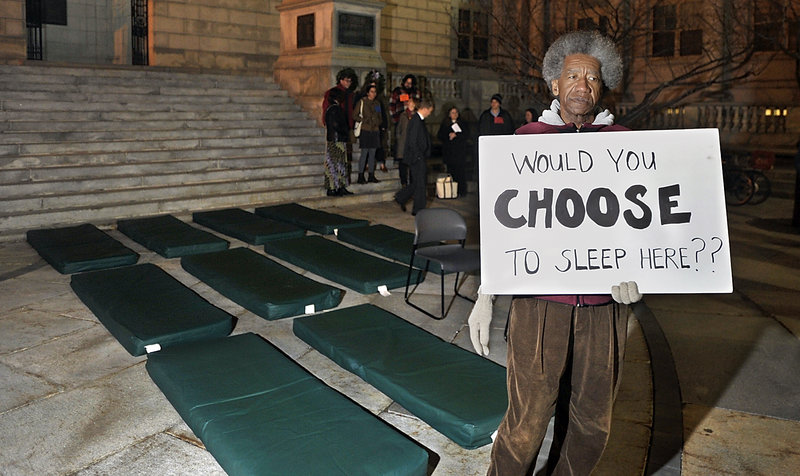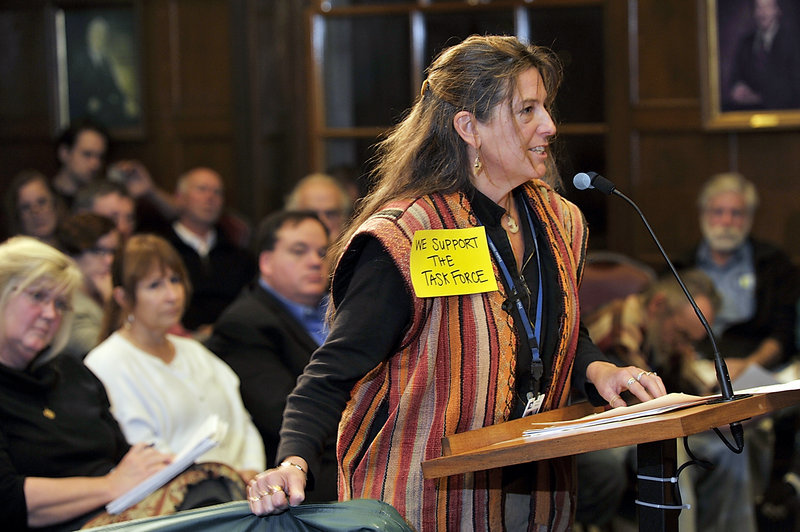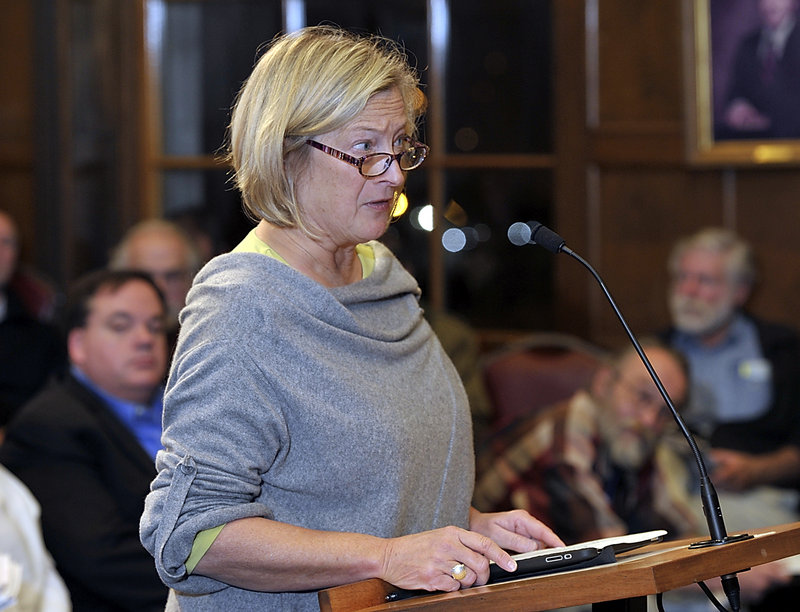PORTLAND – An overflow crowd turned out for Monday night’s City Council meeting to weigh in on a task force report on homelessness that has sparked public debate over the city’s role in helping people in need.
The council accepted the report after nearly two hours of public testimony and referred elements to its committees for study. The committees are expected to report back in the spring.
Before the meeting, dozens of advocates for the homeless held a vigil on the steps of City Hall.
Standing in front of hard plastic chairs and green mats that are used at the city’s Oxford Street Shelter, advocates held signs saying “Would you choose to sleep here?” and “When there are no more mats you sit in a chair with a light on all night.”
“We’re trying to show people what it’s like to be homeless,” said Dee Clarke, an advocate for Homeless Voices for Justice.
Inside City Hall, nearly 40 people weighed in on the report on ending and preventing homelessness, drafted by a task force that the city formed last year.
Advocates said Portland has a moral and social responsibility to provide housing and services to needy people. But other speakers questioned the city’s ability to provide services and asked the council to better disperse social services, which are now concentrated in Bayside.
“You can’t ask one neighborhood to bear the brunt of a lot of issues,” said Steve Hirshon, president of the Bayside Neighborhood Association.
One of the report’s recommendations calls for three 35-unit housing complexes, providing in-house services for residents who have problems such as mental illness or substance abuse.
The task force did not include cost estimates for its recommendations. The current system costs more than $6.7 million per year, and a new, streamlined system could save $2.2 million in emergency care costs, the report says.
“It’s a fact that permanent housing reduces homelessness,” said Maurice Selinger III, president of Preble Street Resource Center’s board of directors. “We also know that housing people costs less than the endless merry-go-round of hospitalization, incarceration and release back to the streets without a plan.”
Advocates for the homeless turned out largely in response to comments made last week by representatives of the business community, who expressed concern that the recommendations, if adopted, could make the city’s problem of homelessness worse.
In response, Donna Yellen of Homeless Voices for Justice said it is “intellectually lazy” to say that Portland is a magnet for the homeless because of its social services.
The Portland Community Chamber said in an 11-page report that the city should become less attractive to people in need, institute standards of behavior for residents of any new housing units and consider a residency requirement for people to receive services.
But on Monday, Chris O’Neil, the chamber’s liaison to City Hall, dismissed the idea of a residency requirement before it was challenged as unconstitutional by the American Civil Liberties Union of Maine and Pine Tree Legal Assistance.
“Such requirements are at best impractical and at worst inhumane,” said O’Neil, saying he looked forward to working with the council committees that will study the report.
Homelessness has long been an issue in Portland and other cities, and demand for assistance has increased significantly since the recession hit in 2008.
Demand peaked this summer, when more than 400 people regularly sought shelter at night. City shelters overflowed to the point where people were spending nights in metal chairs in the city’s General Assistance office.
Anne Pringle, a former Portland mayor, praised the task force’s work but said she was disappointed that it looked only at people who use the shelters and ignored those who camp elsewhere in the city.
The group didn’t tackle the city’s “assumed but not debated” policy of not turning away anyone who seeks shelter, Pringle said.
That policy, dating to 1987, was adopted in response to a homeless encampment erected at City Hall to protest the closing of a shelter.
“Most advocates are totally committed to this (low barrier) service model, but is the broader community committed to it?” asked Pringle. “(Mayor Michael Brennan) and the council represent the broader community, not just the constituency that are here in number tonight.”
The council forwarded recommendations for retooling the emergency shelter system — such as centralizing intake — and increased case management to its Public Safety, Health and Human Services Committee.
It referred recommendations for rapid rehousing — such as developing three new housing complexes — to the Housing and Community Development Committee.
The council may also create a group of task force members to track data and act as a resource for the council committees.
Brennan said he would like the committees to have recommendations ready for the council in May or June.
“I think we’re going to have an opportunity to move forward and really make a difference,” he said.
Staff Writer Randy Billings can be contacted at 791-6346 or at:
rbillings@mainetoday.com
Twitter: @randybillings
Send questions/comments to the editors.





